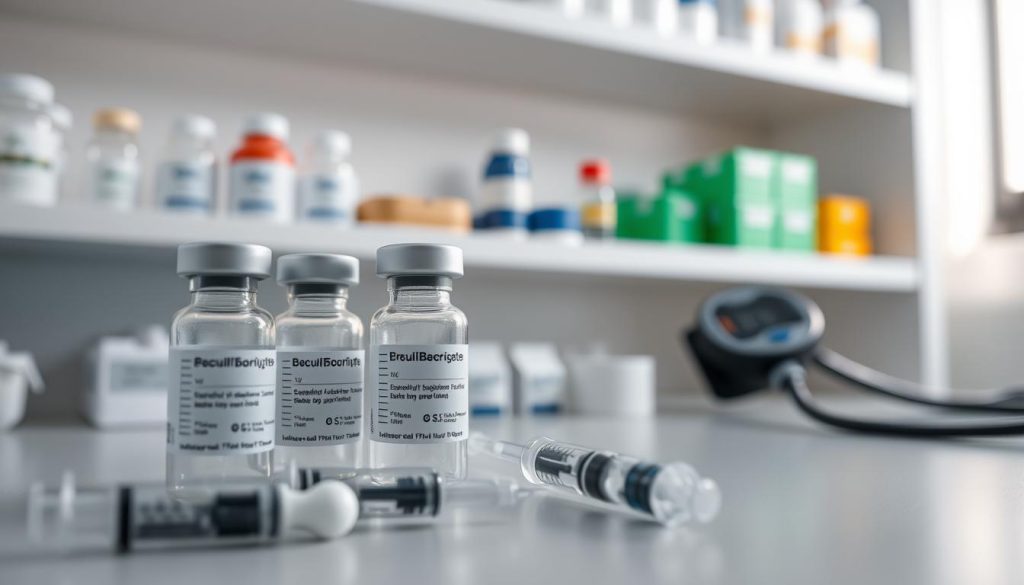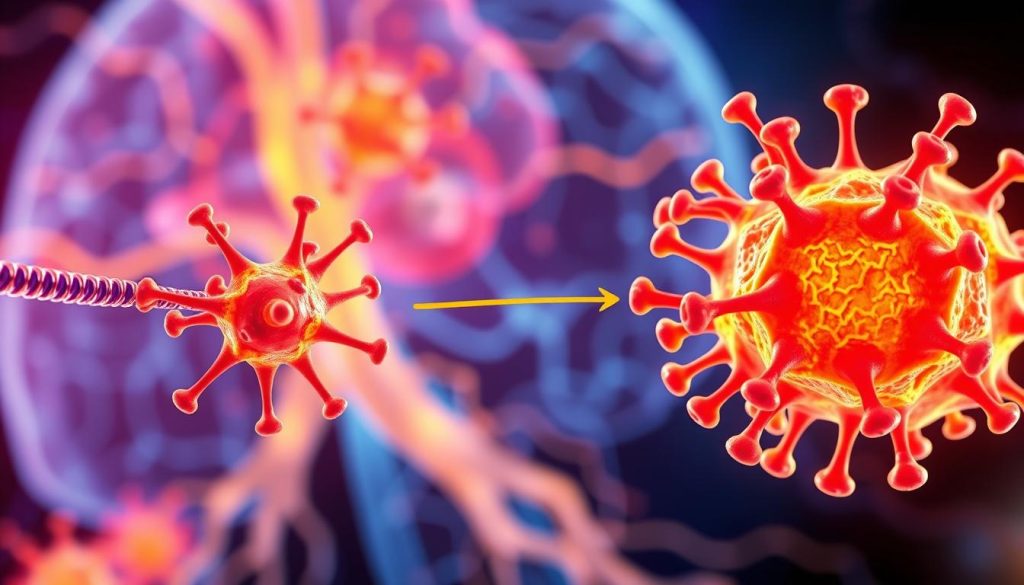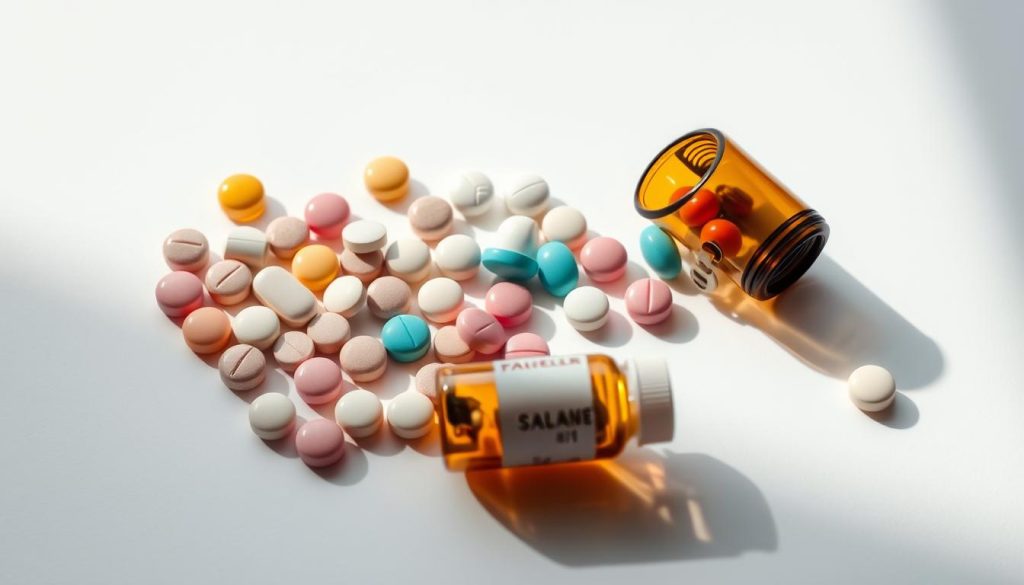When we explore pharmacology, we often wonder: what is barbiturates? These substances are known for their role as central nervous system depressants. They have a wide range of uses in medicine. We will look into how they help and the barbiturates effects on our bodies and minds.
Barbiturates are used to help with sleep problems and to control seizures. They also play a key role in anesthesia. As we dive deeper, we’ll see how new treatments are replacing barbiturates in some cases. For example, HealthWith.com talks about using naltrexone for alcohol use disorder.
This introduction to barbiturates sets the stage for understanding their complex role in medicine. The use of these powerful drugs requires careful balance. This theme will be explored in more detail in this article.
Understanding What Is Barbiturates
We need to look at what barbiturates are and their history. This helps us understand why they are used and regulated today.
Barbiturates Defined: A Complete Overview
Barbiturates are a group of drugs that slow down the nervous system. They come from barbituric acid. But what’s key is how they increase GABA in the brain.
This increase leads to calmness and less anxiety. It makes them useful for some health issues. Yet, they can also lead to addiction.
The Historical Background of Barbiturates Use
Barbiturates started in the early 1900s. They were seen as safer than other sedatives. Soon, they were used worldwide in medicine.
But, as time went on, their risks became clear. This led to a big drop in their use. Safer options like benzodiazepines became more popular.
Learning about barbiturates’ history helps us understand them better. It shows how medical practices and drug safety have changed over time.
| Time Period | Key Development in Barbiturates History |
|---|---|
| Early 1900s | Discovery and Synthesis of Barbiturates |
| Mid-1900s | Rising Usage in Medical Fields |
| Late 1900s | Decline due to Safer Alternatives |
The Therapeutic Applications of Barbiturates
Barbiturates have a long history in medicine, known for their effectiveness in many areas. They are used to treat anxiety, insomnia, and seizure disorders. They also help in starting anesthesia during surgeries.

It’s important to know how barbiturates work in medical settings. They increase the activity of GABA, a key neurotransmitter. This helps control nerve impulses that can lead to seizures and anxiety.
- Anxiety: Barbiturates reduce anxiety by slowing down the nervous system. They help those with acute stress reactions.
- Insomnia: Their sedative effects make them useful for treating severe insomnia for a short time.
- Seizure Control: They are effective in managing epilepsy, reducing seizure frequency.
- Anesthetic Induction: Barbiturates quickly induce sedation, making it easier to start anesthesia.
Even though newer drugs are available, barbiturates are sometimes necessary. Their effectiveness in certain medical situations is clear. It’s vital to weigh their benefits against risks to ensure safe and effective treatment.
How Barbiturates Impact the Nervous System
Barbiturates have a deep impact on our nervous system. They affect how our brain controls calmness and balance. This section explores how these substances work with our brain’s pathways to cause their effects.
The Mechanisms: Barbiturates and the GABA Receptors
Understanding barbiturates starts with their interaction with GABA receptors. These receptors are key in controlling how our nervous system works. Barbiturates make GABA, a calming neurotransmitter, work better by increasing its binding to GABAA receptors.
This action brings more chloride ions into neurons. This makes neurons less likely to fire. As a result, we feel more relaxed and calm.

Neural Pathways Affected by Barbiturates
Barbiturates affect many neural pathways. They have a big impact on areas that control sleep, alertness, and anxiety. The thalamus and the reticular formation are very sensitive to them.
By reducing activity in the reticular activation system (RAS), barbiturates make us less alert. This leads to drowsiness and helps us sleep. These areas also help with muscle relaxation and pain, which is why barbiturates can relax muscles and reduce pain when used correctly.
Barbiturates Uses in Modern Medicine
Even with newer sedatives available, barbiturates remain important in healthcare. This section looks at the barbiturates modern uses in medicine. It shows how these substances are used to handle different medical situations.

Barbiturates are mainly used for severe, sudden medical issues. They work well on the brain and nervous system. They are key in controlling seizures, sedating for procedures, and helping with alcohol withdrawal symptoms.
- Epilepsy Management: Certain barbiturates are vital for managing status epilepticus. This is a serious condition where seizures last too long without breaks.
- Anesthesia: Short-acting barbiturates help start anesthesia quickly. This makes surgeries safer and more effective.
- Neonatal Medicine: Barbiturates are also used in newborn care to stop seizures. This shows their important role in barbiturates in healthcare.
| Condition | Barbiturate Used | Application in Modern Medicine |
|---|---|---|
| Status Epilepticus | Phenobarbital | Used to stop acute seizure activity |
| Surgical Anesthesia | Thiopental | Induces anesthesia rapidly for short surgeries |
| Alcohol Withdrawal | Pentobarbital | Manages severe withdrawal symptoms in controlled settings |
In conclusion, barbiturates modern uses show they are not used as much for long-term treatment. But, their strong effects and quick action make them vital in certain critical care situations. The ongoing use of barbiturates in medicine highlights their importance in barbiturates in healthcare, even as new drugs become available.
Examining the Potential for Barbiturates Addiction
Barbiturates addiction and dependence are big concerns. These substances can harm health and lifestyle. We’ll look at signs of dependence and risk factors for abuse.
Recognizing the Signs of Dependence
Signs of barbiturates dependence include chronic drowsiness and confusion. More serious effects are respiratory depression. Users may also show anxiety, irritability, or mood changes when they stop using.
Understanding the Risk Factors for Barbiturates Abuse
Several factors increase the risk of barbiturates abuse. Genetics are key, with a family history of addiction making a difference. Environmental factors, like high stress or living in a drug-using community, also play a role.
Summary of key indicators:
- Increased tolerance to the drug’s effects, necessitating higher doses for the same effect.
- Persistent use despite the clear negative consequences on personal, social, or occupational fronts.
- Withdrawal symptoms that make cessation difficult without medical assistance.
Knowing these signs and risk factors is vital. It helps in early detection and prevention of addiction. This can lead to timely and effective interventions.
| Sign of Dependence | Risk Factor for Abuse |
|---|---|
| Chronic drowsiness | Genetic predisposition |
| Confusion and incoordination | Environmental stress |
| Respiratory depression | Community drug prevalence |
| Anxiety and mood swings | History of psychological disorders |
Consequences of Long-Term Barbiturates Use
Looking into the long-term effects of barbiturates shows big worries for health. Using barbiturates for a long time can harm both body and mind. It’s important to know these risks.
Chronic Health Impacts
Using barbiturates for a long time can cause serious health problems. It can damage organs like the liver and kidneys. This is because the body has to work hard to process these drugs.
It can also lead to heart issues. This includes changes in heart rate and a higher chance of heart disease.
Cognitive Effects of Prolonged Barbiturates Exposure
The brain effects of long-term barbiturate use are very concerning. It can make it hard to learn, remember, and solve problems. Users might feel less alert and react slower.
This can really affect how well someone can live their life and enjoy it.
Here’s a table showing how long-term barbiturate use can affect the brain:
| Duration of Usage | Observable Cognitive Impacts | Potential Long-Term Outcomes |
|---|---|---|
| 1-3 Years | Mild memory lapses, Decreased concentration | Reversible with cessation |
| 3-5 Years | Increased forgetfulness, Reduced complex problem-solving skills | Potentially reversible with professional intervention |
| 5 Years+ | Significant memory impairment, Marked decline in cognitive flexibility | Possibly irreversible, requiring long-term management |
Barbiturates Overdose: Signals and Response
Knowing the overdose symptoms of barbiturates and the right emergency response can save lives. Here are the key signs to watch for and steps to take if a barbiturates overdose is suspected.
- Slurred speech and confusion
- Significant coordination loss
- Difficulty in breathing
- Severe drowsiness leading to coma
A quick response after spotting any barbiturates overdose symptoms is key. Below is a detailed table of actions to take in the event of a suspected overdose.
| Immediate Action | Professional Care |
|---|---|
| Call emergency services | Hospital admission |
| Provide clear information about the victim’s condition | Administration of intravenous fluids |
| Monitor respiratory functions | Possible stomach pumping |
| Keep the individual awake | Administer activated charcoal |
An effective emergency response needs quick action. It ensures the victim gets the right medical care to lessen the harm of a barbiturates overdose.
Managing Barbiturates Withdrawal Symptoms
Stopping barbiturates can be tough, with many physical and mental signs. It’s key to manage these symptoms well to keep everyone safe and help with recovery. Knowing how to treat withdrawal and the role of medicines is important for both caregivers and patients.
Treatment Strategies for Withdrawal
Handling barbiturates withdrawal needs a mix of medical care and support. These plans are made to fit the person’s health and how bad the withdrawal is.
- Gradual tapering of dosage
- Monitoring in a controlled environment
- Supportive care and symptom management
- Counseling sessions and support groups
Medications to Alleviate Withdrawal Symptoms
Some medicines can really help with barbiturates withdrawal symptoms. Doctors must prescribe these to help keep the patient stable while they detox.
| Medication | Purpose | Common Usage |
|---|---|---|
| Phenobarbital | Reduce symptoms of withdrawal | Substitute tapering therapy |
| Benzodiazepines | Manage anxiety and insomnia | Short-term relief |
| Clonidine | Alleviate autonomic symptoms | Manage high blood pressure and rapid heart rate |
It’s very important to take these medicines only as a doctor says. This way, they can help manage symptoms without causing harm. The right mix of therapy and medicine can make detox easier and help with recovery.
The Legal Status of Barbiturates in the United States
In the United States, barbiturates are controlled by laws that change over time. These laws are shaped by debates on drug policy and public health. To understand the barbiturates legal status, you need to know about federal and state drug scheduling and prescription regulations.
Drug Scheduling and Barbiturates Control
Barbiturates are listed under the Controlled Substances Act (CSA). This act shows their risk for abuse and addiction. The DEA puts different barbiturates in various schedules.
For example, some are in Schedule II, showing high abuse risk. Others are in Schedule III or IV, with lower risks but strict controls. This drug scheduling affects how these drugs are used and regulated.
Prescription Regulations for Barbiturates
The rules for prescription regulations for barbiturates are strict. They aim to stop misuse and keep patients safe. Doctors must give detailed dosage instructions and only after a full medical check-up.
Doctors use special prescription pads for Schedule II barbiturates. States also track these prescriptions to stop fraud and misuse.
Here are some key points about controlling barbiturates based on their schedule:
- Schedule II barbiturates, like pentobarbital, need a written prescription that can’t be refilled.
- Schedule III and IV barbiturates might allow refills up to five times in six months after the prescription is written.
These rules help ensure patients who really need these drugs can get them. But, they also stop misuse and illegal distribution.
Comparing Barbiturates to Other Sedative Medications
Exploring sedative medications reveals the importance of understanding different drug classes. This section compares barbiturates and benzodiazepines, and introduces alternative treatments in modern medicine. We’ll look at safety, how they work, and their effectiveness. This will help us see why some are chosen over others in treatment.
Barbiturates vs. Benzodiazepines: Efficacy and Safety
The debate between barbiturates and benzodiazepines focuses on safety and effectiveness. Benzodiazepines are seen as safer, with a lower risk of overdose. They have replaced barbiturates in many cases because of their fewer side effects and more precise dosing.
Both types work well for calming and reducing anxiety. But benzodiazepines are safer because they have a higher therapeutic index. This means they are less likely to cause problems if taken incorrectly or with other drugs.
Alternative Treatments to Barbiturates
The healthcare world is always looking for better treatments. New options include non-benzodiazepine sleep aids like zolpidem and ramelteon. There are also SSRIs and therapies like cognitive-behavioral therapy for anxiety and sleep issues.
The goal is to find treatments with fewer side effects and less risk of abuse. This search aims to keep patients safe while effectively treating their symptoms.
FAQ
Q: What are barbiturates?
A: Barbiturates are a type of drug that slows down the nervous system. They were once used to help with anxiety, sleep problems, and seizures. They can make you feel very relaxed or even put you to sleep completely.
Q: How do barbiturates affect the brain and body?
A: Barbiturates make the brain’s activity slower by working with a chemical called GABA. This leads to feeling calm, relaxed, and less anxious. They also slow down the heart, breathing, and blood pressure in the body.
Q: What are the medical uses of barbiturates?
A: Today, barbiturates are used less often because safer options exist. They are used in emergencies to control seizures, for severe insomnia, and to start anesthesia for surgery.
Q: Can you become addicted to barbiturates?
A: Yes, barbiturates can be addictive. Taking them regularly can make you dependent on them. You might need more to feel the same effects, which raises the risk of overdose and addiction.
Q: What are the symptoms of barbiturates overdose?
A: An overdose can cause serious problems like not being able to breathe well, confusion, and even coma. If you think someone has overdosed, call for emergency help right away.
Q: How are barbiturates withdrawal symptoms treated?
A: To treat withdrawal, doctors slowly reduce the dose. This helps manage symptoms like restlessness and insomnia. A doctor’s care and possibly medication are needed for a safe withdrawal.
Q: What is the legal status of barbiturates in the United States?
A: In the U.S., barbiturates are controlled substances. They can only be prescribed by a doctor. The DEA closely watches their use to prevent abuse.
Q: How do barbiturates compare to benzodiazepines in terms of efficacy and safety?
A: Barbiturates are more likely to cause addiction and overdose than benzodiazepines. Benzodiazepines are safer and have a wider range of uses, making them a better choice for treating anxiety and sleep issues.
Q: What is the mechanism of action for barbiturates?
A: Barbiturates work by boosting the effect of GABA, a brain chemical. This makes neurons less active, leading to feelings of calm and relaxation.
Q: What are the risks associated with long-term barbiturates use?
A: Long-term use can lead to addiction and dependence. It can also harm organs, affect thinking, and increase the risk of accidents or overdose.


















